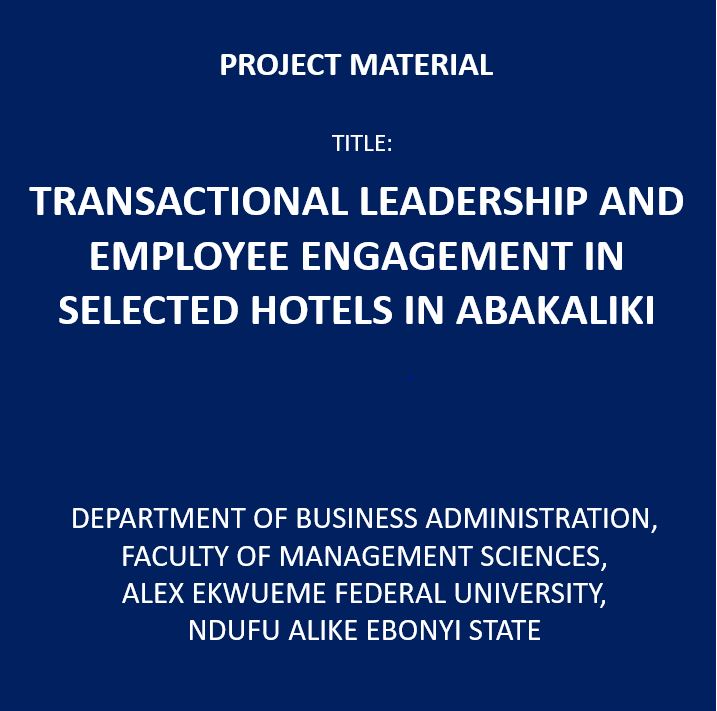No products in the cart.
Transactional Leadership and Employee Engagement in Selected Hotels In Abakaliki
₦10,150.00
TRANSACTIONAL LEADERSHIP AND EMPLOYEE ENGAGEMENT IN SELECTED HOTELS IN ABAKALIKI
- PROJECT YEAR: 2021
- NUMBER OF PAGES: 119
- FILE TYPE: DOC - CHAPTER 1 -5
- DEGREE: BACHELOR
- INSTITUTE: DEPARTMENT OF BUSINESS ADMINISTRATION, FACULTY OF MANAGEMENT SCIENCES, ALEX EKWUEME FEDERAL UNIVERSITY, NDUFU ALIKE EBONYI STATE
Background of Study
Employee engagement refers to how enthusiastic people are about their jobs and how devoted they are to the business, putting up their best effort. Activities, games, and events aren’t the only ways to keep employees engaged. According to Henderson (2009), engagement is something that the employee must provide and cannot be mandated as part of the employment contract. Present day competition is high, and therefore for organizations to be successful and stay competitive, is an advantage that employee engagement can provide; if the right design and program is implemented (prerana 2017).
A major importance of employee engagement is that it (employee engagement) drives performance. When employees feel connected and supported, there will be increase in productivity, and the organization will feel the impact. Organizations that value employee engagement are more likely to encourage people to invest in the job they perform, resulting in higher-quality output. The firm will be able to improve work quality and retain talent by investing in employee engagement. All these can only be achieved with the adoption of transactional leadership in the organization Making the employees of the hotel industry engaged about their jobs also is affected by the leadership of such organization. Regina, Valentyna, and Anita (2017) define leadership as the implementation of ideas, ascertaining people’s characteristics, such as the ability to commune effectively respond to others’ needs, and influencing followers’ behavior; directing them toward achieving the set goals and implementing the leader’s vision. Leadership styles in businesses have an impact on the attitudes and behaviors of workers. According to Robbins and Judge (2016), leadership is defined as the capacity to persuade a group to achieve a common objective. Regardless of the disparity among employees, the right leadership style may act as a magnet, attracting everyone to the center and resulting in a formidable workforce and organizational harmony. This study is very essential because it would help mangers know how to do what they are expected of, and also have appropriate knowledge of transactional leadership and to use it effectively; so as to make employees engage and be passionate about their job, which would in turn enhance organizational goals. This will result in the organization’s success. Leadership is the lifeblood of a business, and a leader’s attitude has a significant impact on how employees behave both on the job and toward their boss. This research aims to teach managers how to carry out management duties using transactional leadership as a tool, resulting in the achievement of short- and long-term organizational goals. Drawing from the above, employee engagement has been investigated by different scholars across the globe, in different industries. Amett Towler (2018), Bapurao, Christina, konje ( 2015), MCmanus & Mosca(2015). Based on the trends above, it appears that none of the scholars have carried out their research in Nigerian work environment, in the hospitality industry; especially in Abakaliki metropolis. This is what motivated the researcher to embark on this study.
No product has been found!
